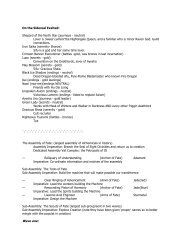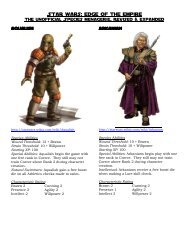13th Age - Foolz!
13th Age - Foolz!
13th Age - Foolz!
Create successful ePaper yourself
Turn your PDF publications into a flip-book with our unique Google optimized e-Paper software.
have to wait in the worst places where no one<br />
expects you.”<br />
The GM buys it and tells Kasarak’s player<br />
that Kasarak can use his Black Fang<br />
background, so the player rolls a d20 and adds<br />
+3 for Black Fang, +3 for Kasarak’s level bonus,<br />
and the half-orc’s Con mod of 1, a total bonus of<br />
+7 vs. the normal adventurer tier environment<br />
DC of 15. If the DM thought the mountain was<br />
particularly nasty it would be a hard check, a<br />
DC of 20.<br />
<br />
Opposed Rolls?<br />
Other d20 games frequently use opposed d20<br />
rolls that pit skill vs. skill. Our system doesn’t<br />
do that much, partly because we’re not tracking<br />
skills for our NPCs and monsters. We’d rather<br />
use DCs set by the environment the skill check is<br />
occurring in than have to figure out accurate<br />
backgrounds/ability scores/skill checks for all<br />
our creatures.<br />
But of course Initiative is sort of an opposed<br />
skill check. And if two PCs are competing to see<br />
who is the first to do something, or who does it<br />
better, by all means, use opposing skill checks<br />
and award speed or quality to the character with<br />
the better result.<br />
<br />
Choosing Your Backgrounds<br />
Most players choose backgrounds that help<br />
them make sense of their character’s past. If<br />
you’re stuck, think about jobs your character has<br />
had. If you’re still stuck, give the job a setting.<br />
Still stuck? Use the short list of backgrounds<br />
below or the lists at the start of each class<br />
section.<br />
The fun of roleplaying diverse characters is<br />
figuring out how your background might help<br />
in unexpected ways. GMs can interpret<br />
backgrounds benevolently or rule out cheesy<br />
ploys. 13 th <strong>Age</strong> isn’t about min-maxing, so<br />
background and skill use is meant to be about<br />
fun in-character methods of attempting to<br />
advance the plot.<br />
Some players will want to choose<br />
backgrounds that correspond to their character’s<br />
class. The most boring way to do that is to say<br />
“Well, I’m a fighter, so I’ll put 4 points into a<br />
fighter background.” We usually don’t settle for<br />
that in our games. Instead we ask players to<br />
figure out what type of fighting their characters<br />
did in the past. Did the fighter learn weapons as<br />
a gladiator? A bounty-hunter? A bodyguard? Or<br />
perhaps as a former sentient magic weapon<br />
turned into a dwarf as a reward for long service<br />
(which would probably also involve the<br />
character’s one unique thing!). So long as the<br />
GM agrees, you should feel free to create a<br />
background story about a group that the<br />
character was part of or perhaps a special magic<br />
or monastic style that’s part of the character’s<br />
past.<br />
<br />
On Languages<br />
It’s a staple of our fantasy games that most<br />
everyone can speak the same language (call it<br />
common) while individual races and monsters<br />
have their own preferred languages (elven,<br />
dwarven, orcish, gnollish, etc.) and that there<br />
are even stranger Big Languages in the world<br />
(magic languages, god tongues, Abyssal, etc.).<br />
Our attitude toward languages is that you<br />
should pay attention to them when it’s cool and<br />
ignore them when it’s not. Is it cool that the orc<br />
berserker screams “Many parts are edible!” in<br />
orcish as he attacks? Absolutely. Is it cool if no<br />
one understands the battlecry? Not so much.<br />
So we assume that most everyone speaks a<br />
common tongue and that when people say<br />
things in other languages, anyone with a<br />
relevant background should be able to speak<br />
enough of the language to piece it together,<br />
especially if they have backgrounds that make<br />
that more likely.<br />
But if you like games that are more specific<br />
about languages, decide what the languages are<br />
going to be in your campaign and then use the<br />
adventurer-tier and champion-tier linguist feats<br />
(see page XX) to provide access to them. Again,<br />
if a player makes a big deal about speaking<br />
languages as part of their background, we say<br />
give it to them, don’t charge feats unless there’s<br />
going to be true advantages in your campaign<br />
© 2012 Fire Opal Media. All rights reserved. 48







